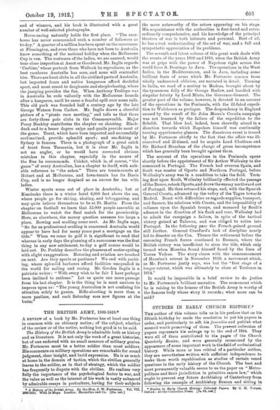THE BRITISH ARMY, 18094810.*
A REVIEW of a book by Mr. Fortescue has at least one thing in common with an obituary notice; of the subject, whether of the review or of the notice, nothing but good is to be said.
The History of the British Army is admirable both as history and as literature. It is not only the work of a great historian, but of one endowed with no small measure of military genius. Mr. Fortescue must be a better soldier than moat soldiers. His comments on military operations are remarkable for sound judgment, clear insight, and lucid expression. He is as much at home in the domain of tactics, which the civilian generally leaves to the soldier, as in that of strategy, which the soldier has frequently to dispute with the civilian. He realizes very fully the importance of the psychological factor in war, and the value as well as the interest of his work is vastly enhanced by admirable essays in portraiture, having for their subjects
• 1 History of the British Army. By the Hon. J. W. Portesene. Vol. VII. EK19-1210. With 12 Maps. London: Wwwnill.n and Co. NIL net.]
the more noteworthy of the actors appearing on his stage. His acquaintance with the authorities is first-hand and extra- ordinarily comprehensive, and his knowledge of the principal theatres of war is both intimate and personal. Best of all, he has a real understanding of the art of war, and a full and sympathetic appreciation of its problems.
The seventh and latest volume of this great work deals with the events of the years 1809 and 1810, when the British Army was at grips with the power of Napoleon right across the world from S. Domingo to Java. The operations in the West Indies, in the Mediterranean, and in Java, including some brilliant feats of arms which Mr. Fortescue rescues from wholly undeserved oblivion, are narrated in detail. Turning to India, we read of a mutiny in Madras, brought about by the tyrannous folly of Sir George Barlow, and handled with singular fatuity by Lord Minto, the Governor-General. The greater part of the volume, however, is devoted to an account of the operations in the Peninsula, with the ill-fated expedi- tion to Walcberen as prologue. The despondency in England caused by the result of Sir John Moore's Coruna campaign was not lessened by the failure of the expedition to the Scheldt. That blow had, indeed, been shrewdly aimed in a direction towards which Napoleon himself was continually turning apprehensive glances. The disastrous event is traced by Mr. Fortescue chiefly to the fact that the affair was ill- conceived and ill-timed, and he acquits Lord Chatham and Sir Richard Strachan of the charge of gross incompetence which has generally been brought against them.
The account of the operations in the Peninsula opens shortly before the appointment of Sir Arthur Wellesley to the command in Portugal. The French had overrun Spain, and &knit was master of Oporto and Northern Portugal, before W ellealey's army was in a condition to take the field. Turn- ing first upon Souk, Wellesley brilliantly effected the passage of the Douro, retook Oporto, and drove the enemy northward out of Portugal. He then retraced his steps, and, with the Spanish General Cuesta, advanced up the valley of the Tagus towards Madrid. Beset with difficulties as regards supplies, transport, and finance, his relations with Cuesta, and the impossibility of reliance upon the Spanish troops, and menaced by Soult's advance in the direction of his flank and rear, Wellesley had to admit the campaign a failure, in spite of the tactical victory gained at Talavera, and was obliged to retire into Portugal. In the following year the French gained ground still further. General Craufurd's lack of discipline nearly led to disaster on the Coa. Thence the retirement before the oncoming French forces continued to Bussaco, where the British victory was insufficient to stem the tide, which only turned when Massena found himself faced by the lines of Torres Vedras. The story closes with the commencement of Massena's retreat in November 1810, a movement which, as Mr. Fortescue justly says, was but the "first stage of a longer retreat, which was ultimately to close at Toulouse in 1814."
It would be impossible in a brief review to do justice to Mr. Fortescue's brilliant narrative. The monument which he is raising to the honour of the British Army is worthy of the famous body whose story it records ; what more can be said?














































 Previous page
Previous page